25 October, 2024
20 minutes

Choosing the right cloud hosting provider for personal use can be a game-changer, especially when it comes to managing costs and ensuring performance. For developers, hobbyists, and individuals working on smaller projects, affordability and reliability are key factors. Cloud hosting allows you to scale your resources as needed without overpaying for services you don’t use. In this guide, we’ll explore the best budget cloud hosting providers in 2024, focusing on platforms that offer the perfect balance between cost-efficiency and scalability for personal projects.
What is Cloud Hosting and Why You Need It

Source: monsterhost
When you're working on a personal project or a small application, finding affordable cloud hosting for personal use is essential. Cloud hosting has become the go-to option for many developers and hobbyists because it offers the perfect combination of scalability, reliability, and performance improvements without breaking the bank.
Cloud hosting is a service that allows websites or applications to be hosted across multiple servers, which means resources like CPU, RAM, and storage are distributed across a network rather than relying on a single server. This setup ensures that your project is always up and running, even if one server goes down or experiences high traffic. For personal projects, this can be a lifesaver as it guarantees uptime without the need for managing complex infrastructure.
The most significant advantage of cloud hosting for personal use is that it’s both affordable and scalable. You can start small, using minimal resources, and then increase your capacity as your project grows. Whether you're building a blog, a portfolio website, or a side application, scalable cloud hosting allows you to pay only for what you use, keeping costs low.
When compared to traditional hosting options, cloud hosting stands out for its flexibility and cost-efficiency. You don’t need to predict future traffic or overpay for resources that may go unused. Instead, cloud hosting platforms adjust resources dynamically based on real-time needs, making it the best budget cloud hosting option for personal projects.
Throughout this article, we'll walk you through the top 7 affordable cloud hosting providers available in 2024, helping you choose the best fit for your needs. Whether you're new to cloud hosting or just looking to cut down on expenses, these providers offer reliable, cost-effective solutions designed for personal projects.
Why Affordability Matters in Cloud Hosting

Source: Shutterstock
Finding the cheapest cloud hosting for personal projects can be a challenge, especially with the wide range of pricing options and features offered by various providers. However, affordability is crucial for developers, freelancers, and hobbyists who need to keep costs low while still maintaining performance and reliability for their personal projects.
Affordable cloud hosting solutions allow users to start small, grow as needed, and avoid overpaying for resources they won’t use. Let’s break down why affordability should be a top priority when selecting a cloud hosting provider for personal use.
Breaking Down Cloud Hosting Costs
Hosting a project in the cloud involves several types of costs. Understanding these costs will help you find the best budget cloud hosting for your needs:
Every project requires some form of storage. Whether it's to host website files, application data, or databases, storage fees can add up. Providers typically charge based on the amount of storage you need, but low-cost cloud hosting options allow users to start with smaller storage limits and scale up as necessary.
Bandwidth refers to the amount of data transferred between your project and users. If your personal project involves high traffic or data-heavy services (like video streaming or large file downloads), bandwidth costs can become significant. Some affordable providers offer unmetered bandwidth or reasonable caps that help control costs without sacrificing user experience.
Traditional hosting often requires significant manual maintenance, including server updates, security patches, and performance tuning. The right budget cloud hosting provider offers automated maintenance, taking care of updates and security without the need for technical expertise. This ensures your project runs smoothly while minimizing time and costs.
Affordable hosting providers typically offer two pricing models: pay-as-you-go or fixed-rate plans. The pay-as-you-go model is ideal for personal projects with fluctuating traffic, allowing you to pay only for what you use. On the other hand, fixed-rate plans provide predictable monthly costs, which is helpful for those who prefer stability in their budget.
Pay-as-you-go plans offer the following advantages:
Pay for the exact resources consumed
Ideal for projects with varying usage patterns
Can help save money during periods of low traffic
Fixed-rate plans offer:
Predictable monthly fees for budget management
Easier forecasting for long-term projects
Often include bundled services, reducing the need for additional costs
Choosing between these two models depends on your project's needs. For developers working on side projects or hobby apps, pay-as-you-go is usually the most cost-effective choice.
Avoiding Hidden Costs in Cloud Hosting
Even with cheap VPS hosting or low-cost cloud platforms, hidden fees can increase your overall expenses. When selecting a provider, it’s essential to look out for these potential pitfalls:
Bandwidth Overage Charges
Many cloud hosting providers set bandwidth limits on their plans. While the monthly fee might seem low, exceeding these limits can lead to costly overage charges. Ensure you understand the bandwidth allocation and choose a provider that offers clear, reasonable limits to avoid unexpected fees.
Storage Fees
Similar to bandwidth, some providers charge for additional storage beyond the initial limit. Pay attention to how much storage is included in the plan and what the cost is for expanding that storage. Some low-cost cloud hosting platforms offer flexible storage options, allowing you to scale your storage without incurring steep fees.
Support Costs
Some budget providers charge extra for advanced support services. While basic support may be included, make sure to check whether 24/7 support or dedicated support agents come at an additional cost. If you're running a personal project, having access to reliable support at no extra cost can be a significant advantage.
By carefully selecting a provider that minimizes hidden costs, personal projects can thrive without worrying about unexpected charges.
Why Affordable Hosting Providers Are Ideal for Personal Projects
For those working on personal projects, keeping expenses low while maintaining flexibility is key. Here’s why choosing an affordable hosting provider can make all the difference:
Scalability Without the Overhead
Many affordable cloud hosting solutions offer scalability as a core feature. This means your project can grow without having to migrate to a different provider or face large upfront costs. As traffic increases, these providers adjust resources automatically, ensuring that your website or application stays responsive without inflating your budget.
Low Financial Risk
Personal projects, especially hobby apps or small websites, often start with low or no revenue. In these cases, spending too much on hosting can make the project financially unsustainable. By opting for budget cloud hosting, you reduce your financial risk while still gaining access to high-quality infrastructure.
Performance and Flexibility
Affordable doesn’t have to mean sacrificing performance. Many cheap VPS hosting options provide high-performance servers with SSD storage, fast loading times, and reliable uptime. Choosing a provider that offers flexible pricing along with solid performance ensures your project runs efficiently without draining your wallet.
Freedom to Experiment
Affordable hosting solutions give hobbyists and developers the freedom to experiment with different features, frameworks, or technologies without worrying about excessive costs. Whether you’re building a side project or learning new skills, having access to low-cost cloud hosting lets you explore and innovate without financial pressure.
How Affordable Hosting Supports Growth Potential
For any project to be successful, it needs to be able to grow. While affordability is essential in the early stages of a project, a cost-effective cloud hosting provider also needs to offer scalability to ensure long-term success.
Start Small, Scale Gradually
Many budget hosting platforms allow users to start with minimal resources and increase capacity as the project grows. This means you won’t have to commit to a higher-tier plan until it’s absolutely necessary. As your project gains traffic, you can gradually add more storage, bandwidth, and processing power, ensuring your hosting infrastructure grows alongside your needs.
No Long-Term Contracts
Affordable providers often avoid long-term contracts, allowing you to scale down or cancel your plan if necessary. This is particularly useful for developers with projects that have varying demands or those who prefer flexibility.
Support for Various Project Types
From simple blogs to more complex applications, cost-effective cloud hosting platforms support a wide range of projects. Providers like DigitalOcean, Vultr, and Hostinger offer tailored solutions that fit different needs, from lightweight websites to more demanding applications. This flexibility ensures that whatever your project entails, you won’t be forced to pay for unnecessary resources.
The Key Benefits of Choosing an Affordable Provider
Making the decision to opt for an affordable cloud hosting provider isn’t just about saving money—it’s about gaining access to a range of benefits designed to help your project thrive. Here’s what you can expect from the best budget cloud hosting 2024 options:
Budget-Friendly Plans
Providers offer low-cost plans that suit the needs of individuals and small teams. These plans include essential features like unmetered bandwidth, automated backups, and security updates without the heavy price tag.
Ease of Use
Budget-friendly hosting solutions often come with user-friendly control panels, making it easy to deploy and manage your applications. Even developers with limited cloud experience can quickly get their projects up and running.
Global Data Centers
Affordable cloud providers operate data centers around the world, ensuring that your users enjoy low latency and fast load times, no matter where they’re located. This global reach is particularly beneficial for personal projects targeting an international audience.
Security and Compliance
Low-cost hosting doesn’t mean compromising on security. Many budget providers offer SSL certificates, DDoS protection, and compliance with international security standards, ensuring your personal project is protected from cyber threats.
By selecting an affordable cloud hosting provider that balances performance, cost, and scalability, developers can focus on their projects without worrying about exceeding their budget.
Choosing the cheapest cloud hosting for personal projects is about more than just the lowest price. It's about finding a provider that offers the right balance of affordability, flexibility, and performance for your needs. With the right choice, your personal project can grow and thrive without the financial stress often associated with traditional cloud hosting providers.
Affordable hosting solutions make it easier to experiment, scale, and improve without overpaying for unnecessary resources. Whether you’re building a small website or a more complex application, there are plenty of budget-friendly options that can help you reach your goals without compromising on quality.
Key Features to Look for in Affordable Cloud Hosting
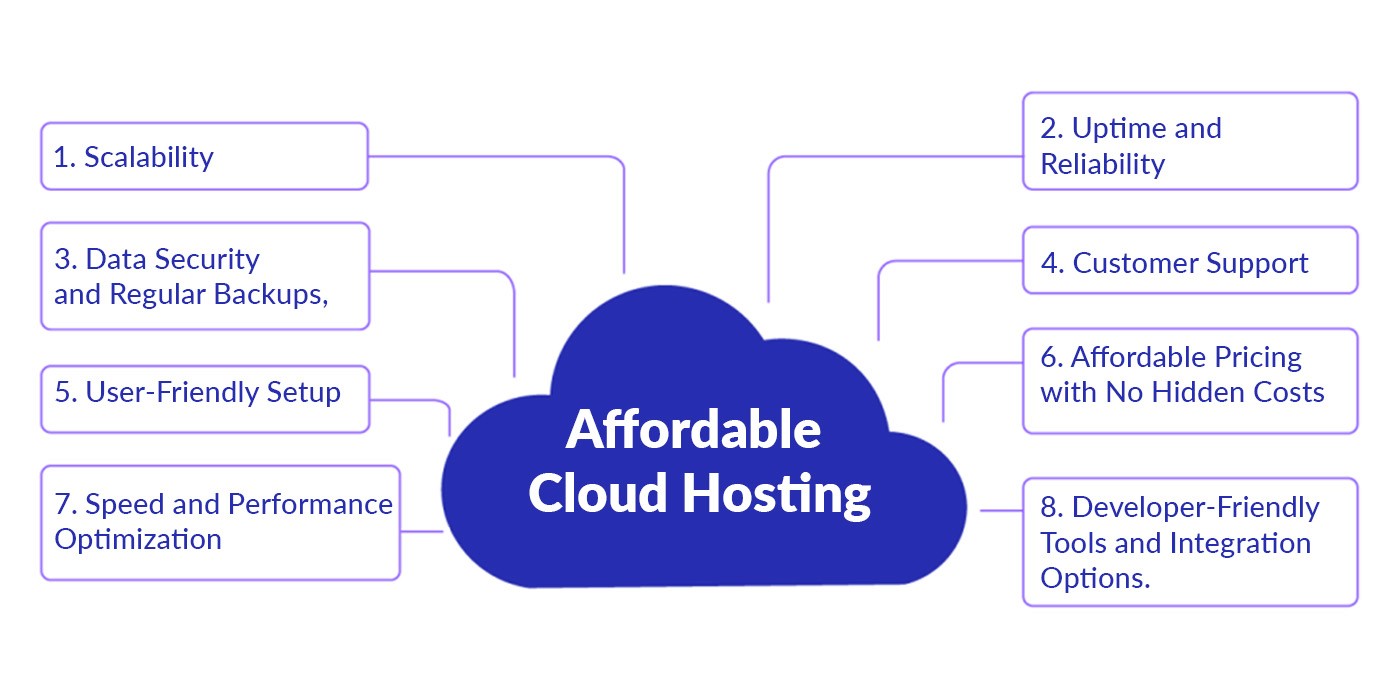
When choosing affordable cloud hosting features for personal projects, knowing what to prioritize ensures you get the best value without sacrificing performance or security. While price is important, focusing on the right features can make a huge difference in how effectively your project runs.
Here are the key features to look for when selecting cloud hosting for personal projects or small-scale applications.
1. Scalability: Growing with Your Project
Scalability is one of the most important features in any cloud hosting service. For personal projects, you want the flexibility to start small and grow as your needs expand. Choosing a hosting provider that offers scalable resources ensures your project can handle increased traffic without interruptions.
Why Scalability Matters:
Resource Flexibility: As your website or application grows, you may need more CPU, storage, or bandwidth. Cloud hosting allows you to adjust these resources in real-time.
Cost Efficiency: You only pay for what you use. Whether your project experiences occasional traffic spikes or consistent growth, scalable hosting helps you manage costs effectively.
Avoiding Downtime: Scalable hosting automatically allocates resources during peak times, keeping your site running smoothly without needing to upgrade manually.
Look for providers that offer auto-scaling capabilities, meaning resources like CPU and memory adjust automatically based on usage. This is crucial for maintaining performance while controlling costs.
2. Uptime and Reliability: Keeping Your Project Online
Uptime refers to how often your server is operational and accessible. For most personal projects, having a reliable uptime is key to maintaining user trust and ensuring your site is always available.
What to Look For:
99.9% Uptime Guarantees: This is the industry standard for affordable cloud hosting. A guarantee means that the provider compensates you if uptime falls below the agreed threshold.
Redundant Servers: Providers with multiple servers across different regions can offer better reliability. If one server goes down, another can take over, minimizing downtime.
Reliable uptime ensures that your personal website, blog, or small application remains accessible to users at all times. Even a few minutes of downtime can lead to lost visitors, especially if your site is still growing its audience.
3. Data Security and Regular Backups: Protecting Your Project
For any online project, whether personal or professional, data security is essential. Affordable hosting providers should still offer robust security measures to protect your data and that of your users.
Critical Security Features:
SSL Certificates: Look for providers that offer free SSL certificates, as they ensure secure data transmission between your site and its users.
Data Encryption: Hosting platforms should encrypt data both at rest (stored) and in transit (being sent or received).
DDoS Protection: Protection against Distributed Denial of Service (DDoS) attacks is necessary to keep your site online during malicious attempts to overwhelm it with traffic.
Automatic Backups: Regular backups ensure that even if something goes wrong, you won’t lose your data. Look for hosting that offers daily or weekly backups without additional fees.
For personal projects, having these low-cost cloud hosting features is critical to maintaining security without adding complexity or high costs to your hosting plan.
4. Customer Support: Reliable Help When You Need It
No matter how user-friendly a platform might be, issues can arise, and having access to 24/7 customer support is a valuable asset. Whether it's a technical question or a service disruption, knowing you can get help quickly is essential.
What Good Customer Support Looks Like:
24/7 Availability: Personal projects often run outside normal business hours, so it’s important to have access to support anytime you need it.
Live Chat and Phone Support: Instant help can make all the difference when resolving an issue quickly. Providers offering live chat or phone support tend to resolve problems faster than those relying solely on email tickets.
Knowledge Base: A comprehensive support center or knowledge base filled with guides and FAQs can also help you troubleshoot basic issues independently.
Having access to reliable and helpful support can make the difference between a small issue becoming a major headache or being solved in minutes.
5. User-Friendly Setup: Simple, Fast, and Efficient
For many individuals working on personal projects, the setup process is crucial. You want a hosting platform that’s easy to navigate, even if you don’t have a lot of technical expertise.
What to Look For in Ease of Use:
One-Click Installations: Platforms that offer one-click installations for popular CMSs (Content Management Systems) like WordPress, Joomla, and Drupal can save time and eliminate complexity.
Intuitive Control Panel: Whether it’s cPanel or a custom dashboard, the control panel should be easy to use and navigate. Tasks like managing domains, setting up email accounts, and adjusting settings should be simple to execute.
GitHub or Bitbucket Integration: If you’re working on a web application, being able to connect your project directly from your Git repository simplifies deployment. This feature is particularly useful for developers working on personal cloud projects.
A user-friendly interface ensures that you spend more time building your project and less time figuring out how to manage your hosting.
6. Affordable Pricing with No Hidden Costs
For personal projects, managing costs effectively is often a top concern. It’s essential to choose a hosting provider that not only offers affordable plans but is also transparent about pricing to avoid hidden fees.
What to Consider:
Clear Pricing Tiers: Look for hosting platforms with transparent pricing models. The cost of additional resources (like more storage or bandwidth) should be clear upfront.
Free Trials or Low Entry Plans: Many affordable hosting platforms offer a free tier or low-cost entry plans that allow you to test the service before committing. This is ideal for personal projects with limited budgets.
No Hidden Fees: Ensure the pricing plan clearly outlines costs for extra services like backups, bandwidth, or customer support, so there are no surprises down the road.
An affordable cloud hosting plan that’s both cost-effective and transparent lets you focus on the growth of your project without worrying about unexpected charges.
7. Speed and Performance Optimization: Keeping Things Fast
Speed is essential, even for personal projects. Hosting providers should offer performance features that keep your site or app running quickly, regardless of how many users access it.
Performance Features to Look For:
SSD Storage: Hosting with solid-state drives (SSD) is faster than traditional hard drives. SSD storage ensures quick read/write speeds, which leads to faster page load times and a better user experience.
Content Delivery Network (CDN): A CDN distributes your content across multiple global servers, reducing latency and improving load times for users accessing your site from different locations.
Caching: Some cloud hosting providers offer built-in caching solutions to store static versions of your site, speeding up load times for repeat visitors.
Fast hosting is not only about user experience but also affects SEO rankings, making this feature essential for personal projects that aim to reach a wider audience.
8. Developer-Friendly Tools and Integration Options
For developers working on more advanced personal use cloud projects, having access to a range of developer tools can make a significant impact on productivity.
Look for Hosting Providers That Offer:
SSH Access: Secure Shell (SSH) access is essential for developers who need command-line control over their server.
Staging Environments: A staging environment allows you to test changes to your website or application before going live, ensuring that new updates won’t cause issues.
Version Control Integration: The ability to connect your cloud hosting account to Git or other version control systems is invaluable for those working on web applications.
These features help developers streamline their workflow while maintaining flexibility in managing and deploying projects.
Selecting the right affordable cloud hosting features for personal projects is about balancing cost with essential functionality. Prioritizing scalability, security, uptime, ease of use, and reliable customer support ensures that your project will run smoothly and grow over time.
Finding the best features for personal cloud hosting helps you maximize the value of your hosting plan while keeping your project manageable, cost-effective, and ready for future growth.
Top 7 Affordable Cloud Hosting Providers for Personal Use in 2024

Choosing the best budget cloud hosting provider can be the key to scaling your personal projects without stretching your budget. Whether you're a freelancer, developer, or hobbyist, the right cloud hosting solution needs to be affordable, reliable, and scalable. Below are the top 7 cloud hosting providers for 2024, each offering unique features, pricing, and benefits tailored for personal use.
1. ToyStack
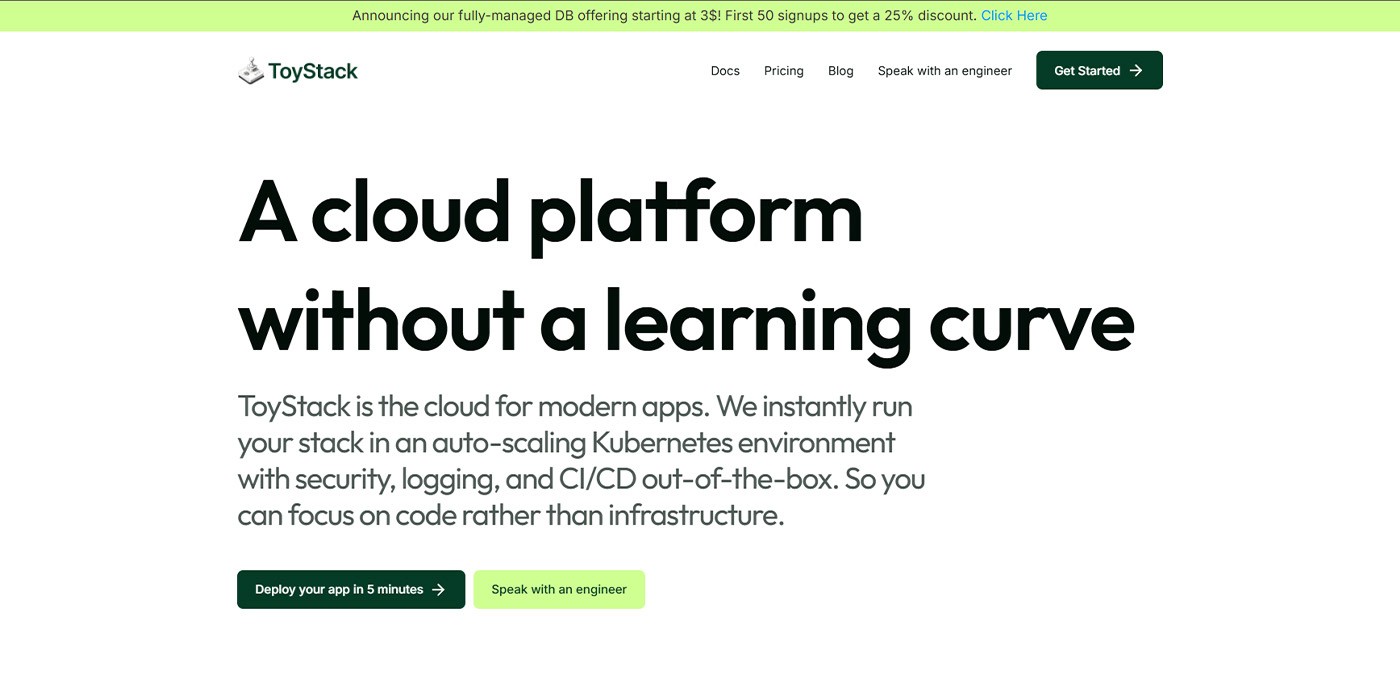
Source: toystack
ToyStack is a next-gen affordable cloud hosting provider designed to make cloud infrastructure management simple and accessible. Built with hobbyists, freelancers, and small businesses in mind, ToyStack offers an intuitive platform for easy deployments, automatic scaling, and cost-effective cloud management.
Key Features:
One-click deployments for applications, databases, and more.
Built-in Kubernetes-powered infrastructure for automated scaling.
3GB SSD storage included in the basic plan.
Integrated real-time monitoring with Prometheus and Grafana.
Automated backups and point-in-time recovery for databases.
Pricing:
Starts at $3 per month for basic plans, which include 3GB SSD storage and automatic scaling.
Transparent pricing without upfront costs or hidden fees.
Pros:
Extremely user-friendly interface for developers of all skill levels.
Auto-scaling ensures you only pay for the resources you use.
No deep DevOps knowledge required, making it ideal for non-experts.
Real-time performance monitoring and automated daily backups.
Cons:
Currently fewer regions compared to large providers like AWS or Google Cloud.
Advanced customization options may be limited compared to larger platforms.
Ideal Use Case: ToyStack is perfect for hobbyists, developers, and small businesses that want an easy-to-use, affordable cloud hosting solution. Its simple interface and powerful auto-scaling capabilities make it an excellent choice for personal projects that need professional-grade infrastructure without the complexity or high costs.
ToyStack stands out as one of the most affordable solutions, with pricing starting at $3 per month. ToyStack is designed for hobbyists, freelancers, and small businesses, offering features like one-click deployments, built-in auto-scaling, and real-time monitoring. Storage starts at 3GB SSD, and the platform provides automatic resource scaling, ensuring you only pay for what you need. With a 99.9% uptime guarantee and 24/7 support through chat and Discord, ToyStack is a great choice for small projects that need professional-grade infrastructure without complexity. Security is also a priority, with daily backups and ISO-certified protection.
2. Kamatera
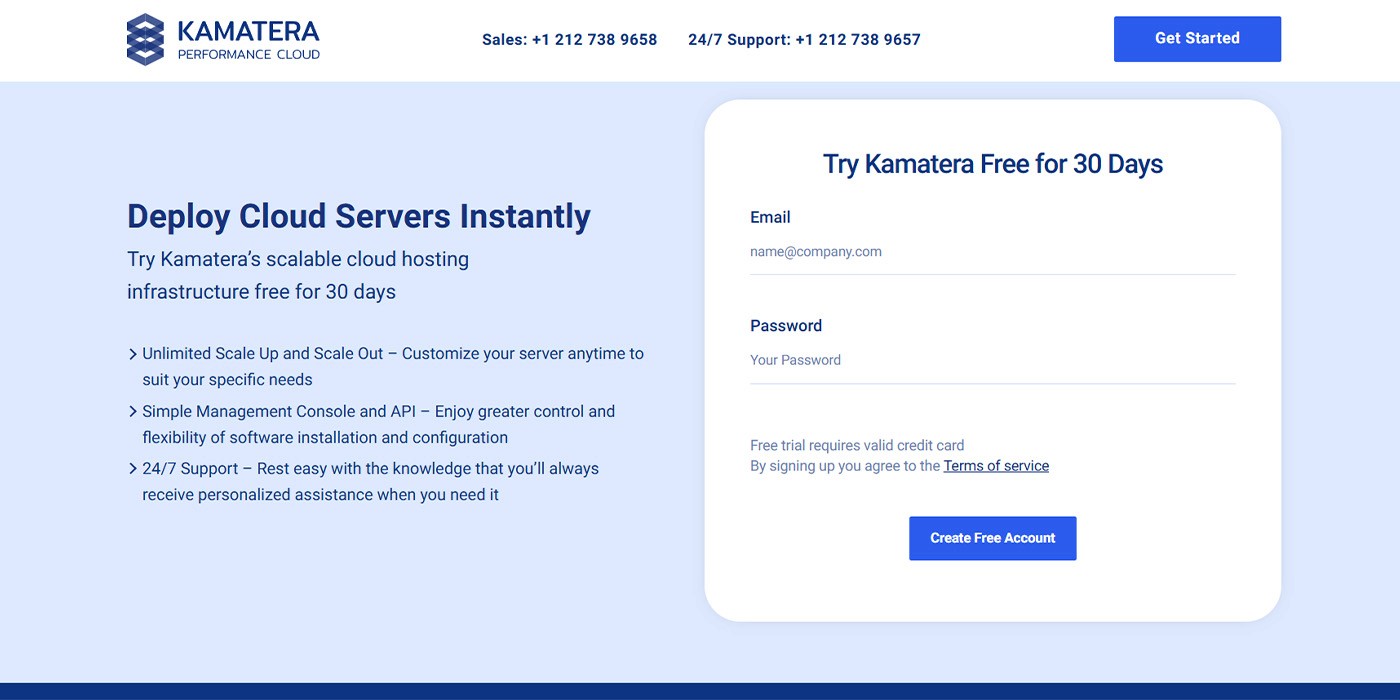
Source: Kamatera
Kamatera offers flexible cloud hosting with a wide range of configurations. Known for its scalability and powerful infrastructure, Kamatera is perfect for those who want enterprise-grade features on a budget.
Key Features:
30-day free trial to test the platform.
Highly scalable with custom resource configurations.
13 global data centers for low-latency performance.
Advanced security with firewalls and backups.
Pricing:
Starts at $4 per month for basic cloud server configurations.
Pay-as-you-go pricing, so you only pay for what you use.
Pros:
Highly customizable server setups.
Great for scaling as your project grows.
Affordable pricing with a flexible billing structure.
Cons:
Interface may be complex for beginners.
Add-ons can increase costs.
Ideal Use Case: Kamatera is ideal for developers and tech-savvy users who need scalable resources and control over their server configurations. Freelancers with fluctuating traffic demands will benefit from the flexible pricing model.
Kamatera offers a highly customizable cloud hosting experience, starting at $4 per month. It's a great choice for developers who need custom server configurations and access to global data centers. Kamatera operates on a pay-as-you-go model, meaning you only pay for the resources you actually use. Its uptime guarantee is an impressive 99.95%, and support is available 24/7 through phone, chat, and email. Kamatera also offers robust security features such as firewalls, backups, and DDoS protection, making it a solid option for developers who need advanced control over their cloud infrastructure.
3. Hostinger
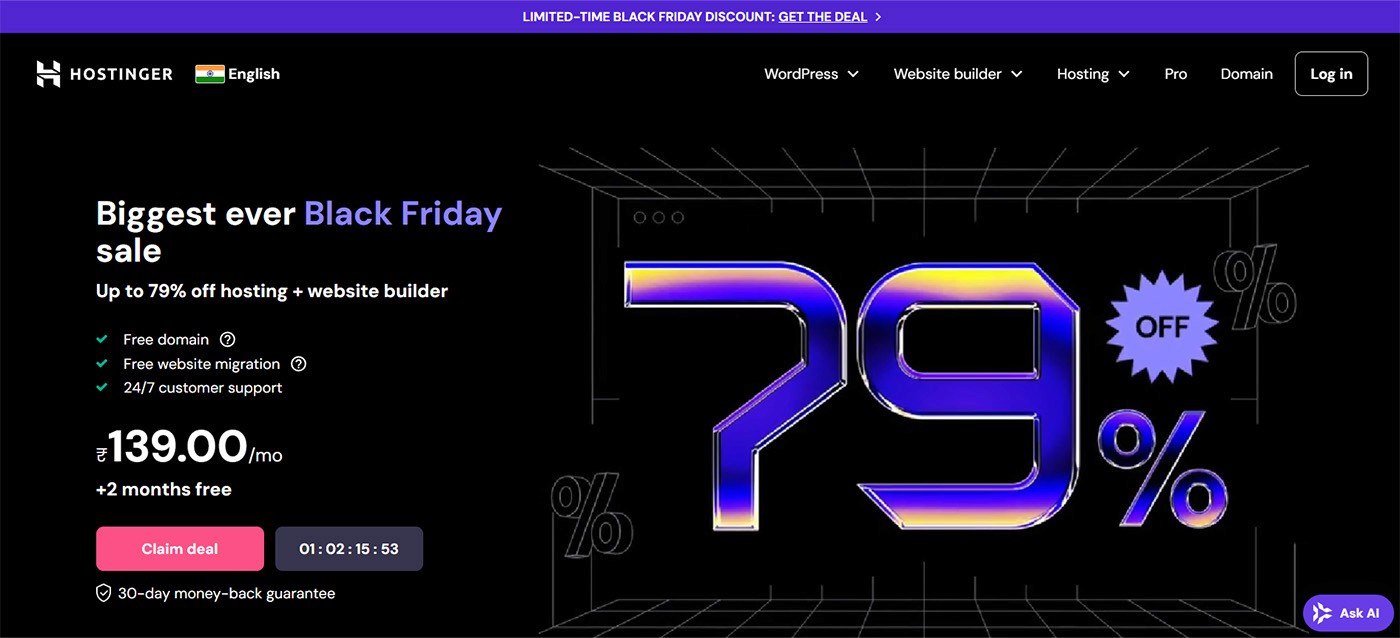
Source: Hostinger
Hostinger is one of the most affordable cloud hosting providers for personal use. Known for offering powerful features at a low cost, Hostinger is perfect for those working on small projects or personal websites.
Key Features:
Free SSL and daily backups included.
Integrated Cloudflare CDN for faster site speeds.
Intuitive control panel designed for beginners.
99.9% uptime guarantee.
Pricing:
Starts at just $9.99 per month.
Discounts for longer-term plans, making it one of the cheapest VPS hosting options available.
Pros:
User-friendly interface suitable for beginners.
Free domain registration with premium plans.
Great performance at a low cost.
Cons:
Limited support for highly advanced projects.
Customer support can be slow during peak times.
Ideal Use Case: Hostinger is best for personal websites, blogs, or small projects where affordability and ease of use are priorities. It's an excellent choice for freelancers and beginners.
Hostinger provides a more beginner-friendly option, starting at $9.99 per month. It includes features such as free SSL certificates, daily backups, and Cloudflare CDN integration, which ensures fast loading times for personal websites and smaller applications. Hostinger offers 100GB SSD storage and is easily scalable through its premium plans. Uptime is guaranteed at 99.9%, and 24/7 live chat support is available for users who need assistance. With built-in security features, Hostinger is ideal for freelancers and personal websites looking for a reliable, affordable solution.
4. A2 Hosting
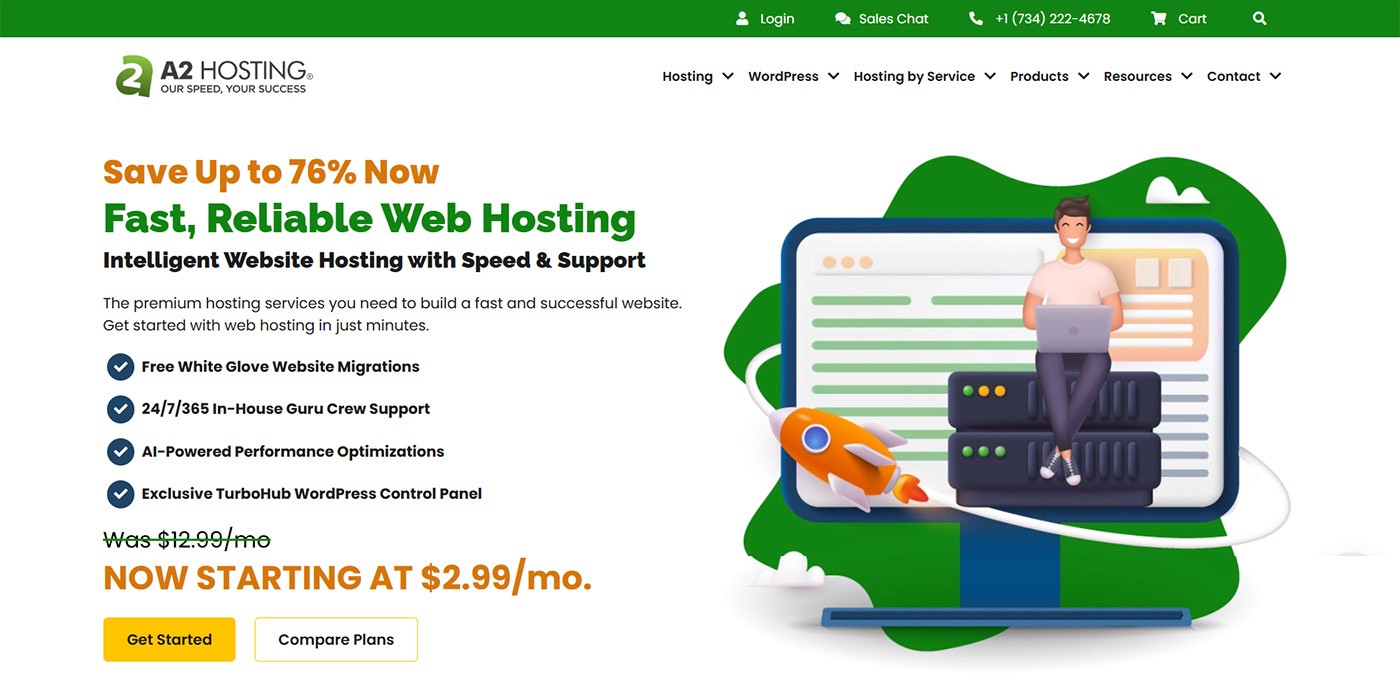
Source: A2 Hosting
A2 Hosting offers affordable VPS hosting with a focus on speed and reliability. Their cloud hosting services come with impressive uptime and strong security features.
Key Features:
Turbo servers for up to 20x faster performance.
Free site migration and SSL.
Developer-friendly with support for multiple programming languages.
SSD storage for fast read/write speeds.
Pricing:
Starts at $5 per month for their Unmanaged VPS plans.
Higher-tier managed plans start at $25 per month.
Pros:
Excellent performance for the price.
Free site migration makes it easy to switch.
High level of security with regular patches.
Cons:
Unmanaged plans require more technical know-how.
Managed VPS plans are more expensive.
Ideal Use Case: A2 Hosting is perfect for developers who need performance optimization and are comfortable managing their own servers. It’s also ideal for users needing reliable uptime for personal apps or websites.
A2 Hosting emphasizes speed and performance, with pricing starting at $5 per month. A2 Hosting’s key feature is its Turbo servers, designed to deliver faster performance. With 100GB SSD storage and scalable VPS options, this platform is perfect for developers who prioritize speed. A2 Hosting guarantees 99.9% uptime and offers 24/7 phone and chat support. Its security measures include free SSL certificates and regular patches, making it a great option for developers with demanding performance needs.
5. Vultr
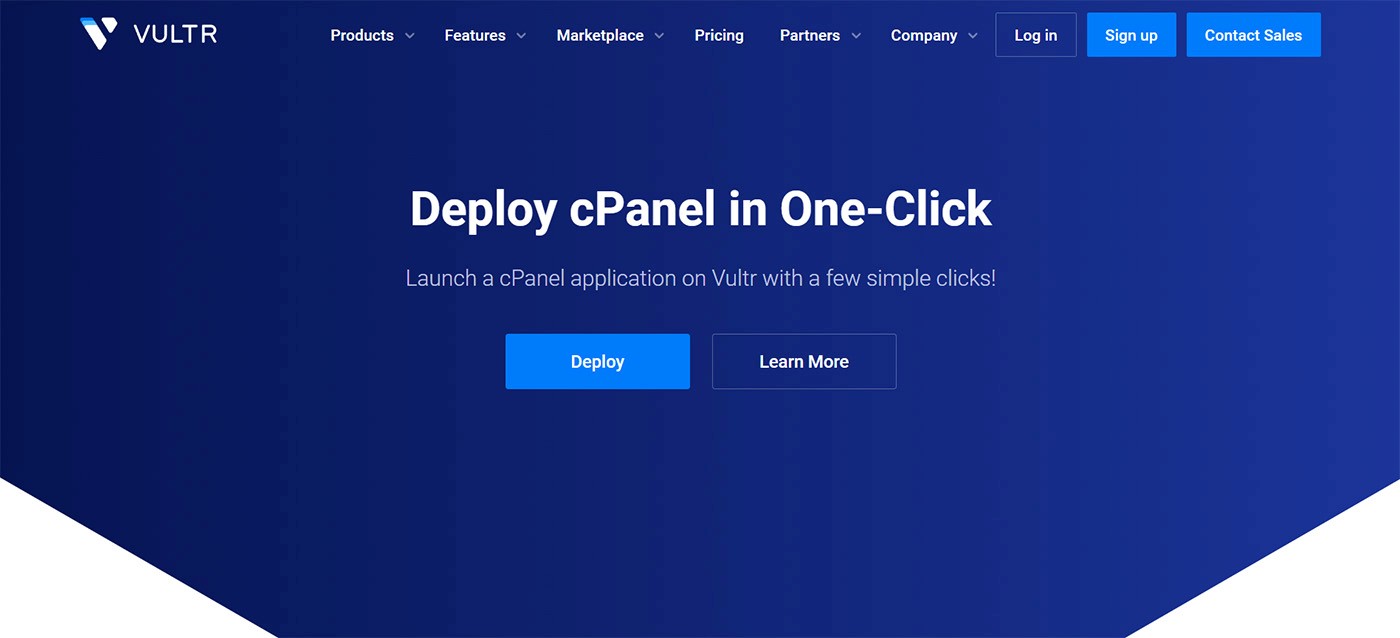
Source: Vultr
Vultr provides highly customizable cloud hosting options with data centers spread across the globe. Its pay-as-you-go pricing and high-performance infrastructure make it a solid choice for personal projects that need flexibility.
Key Features:
Over 25 global locations for ultra-low latency.
Hourly billing, so you only pay for the resources used.
One-click app deployments for popular platforms like WordPress.
Built-in DDoS protection and backups.
Pricing:
Starts at $2.50 per month for basic VPS hosting.
Pricing is based on hourly usage with scalable resources.
Pros:
Ultra-low cost for entry-level projects.
Flexible and scalable for growing apps.
Easy to deploy with one-click apps.
Cons:
No phone support; customer service is primarily ticket-based.
Managed hosting plans can be expensive.
Ideal Use Case: Vultr is best for developers and freelancers who need affordable cloud servers with customizable options. Its pay-per-hour pricing makes it great for those experimenting with different projects or running apps that may experience varying levels of traffic.
For those who need global infrastructure and flexible billing, Vultr is a strong option with pricing starting at $2.50 per month. Vultr is known for its global data centers and hourly billing, allowing users to only pay for what they use. The platform offers 10GB SSD storage on its basic plan, and its uptime guarantee is a solid 99.99%. Support is primarily offered through email and ticket-based systems, but the platform also provides built-in DDoS protection, making it ideal for freelancers who require flexible, low-cost cloud hosting.
6. DigitalOcean
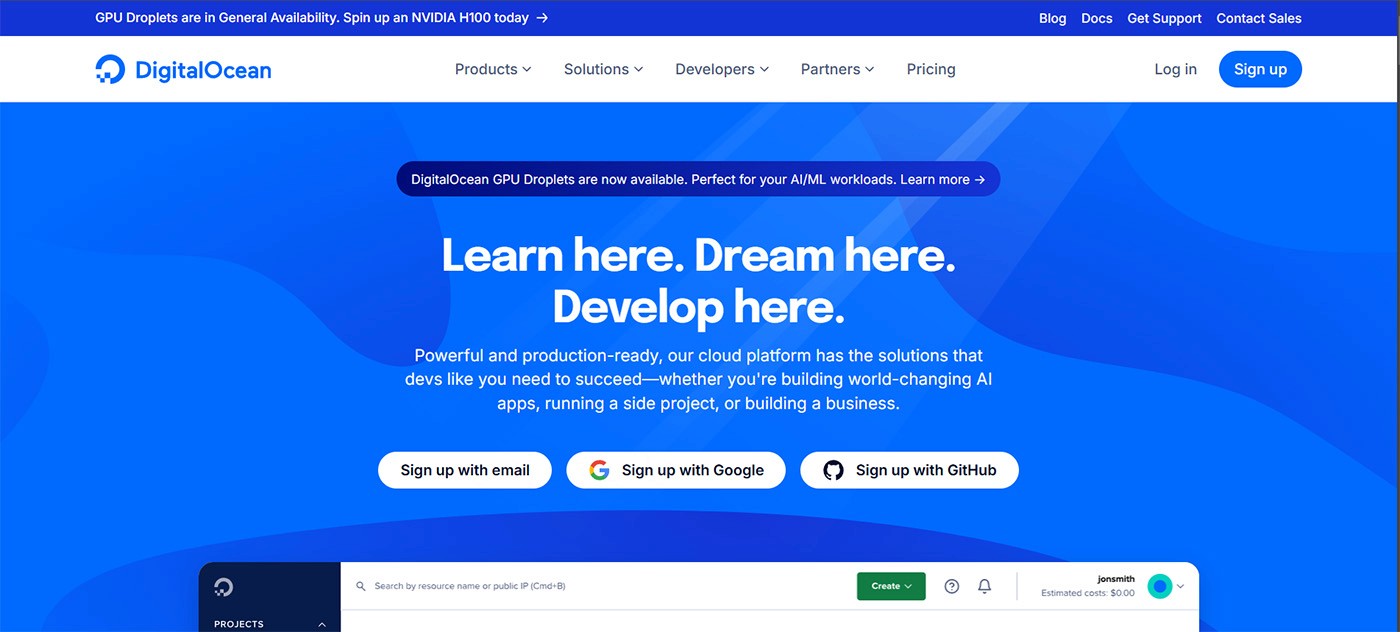
Source: DigitalOcean
DigitalOcean is a popular choice among developers for its simplicity and affordability. It offers a range of cloud services ideal for those building personal projects that require consistent performance.
Key Features:
Droplets (virtual private servers) allow for easy scaling.
Pre-configured one-click apps such as WordPress and MongoDB.
Team collaboration tools and monitoring.
Built-in security with backups and firewalls.
Pricing:
Starts at $5 per month for basic Droplets.
Pay-as-you-go model ensures you only pay for the resources used.
Pros:
Simple and intuitive dashboard.
Extensive community support and tutorials.
Great balance between affordability and performance.
Cons:
Limited customer support options (no live chat).
May lack advanced features for enterprise use.
Ideal Use Case: DigitalOcean is perfect for developers looking for simple, no-frills cloud hosting. It’s an excellent choice for personal blogs, small applications, or freelancers needing reliable low-cost hosting.
DigitalOcean, another popular provider, starts at $5 per month and is well-known for its Droplets, which provide scalable VPS solutions. With 25GB SSD storage and automatic scaling based on demand, DigitalOcean is ideal for developers and startups looking for a simple, scalable platform. Its uptime guarantee is 99.99%, and while support is mainly community-based, it also offers ticket support. Security features include firewalls and backups, making it a reliable choice for small teams or individuals.
7. Cloudways
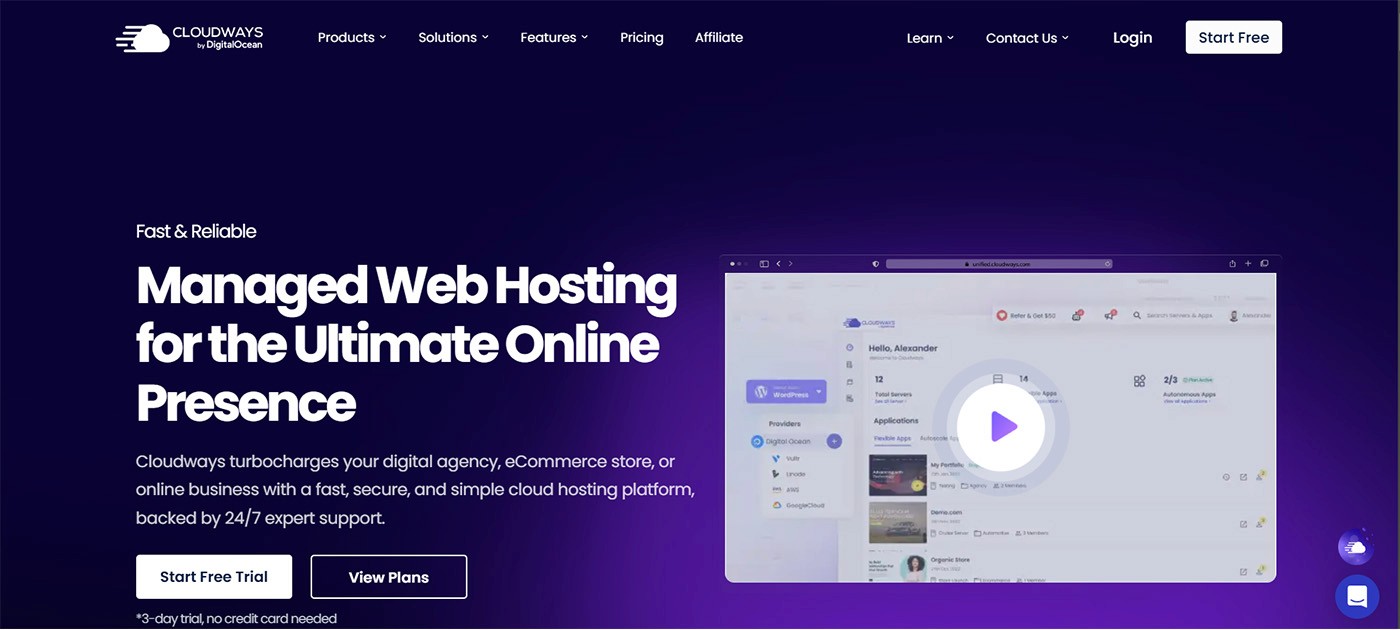
Source: Cloudways
Cloudways is a managed cloud hosting platform offering powerful features without the need for deep technical knowledge. By using top-tier cloud providers like AWS, Google Cloud, and DigitalOcean, Cloudways provides a user-friendly interface that makes cloud management easy.
Key Features:
Managed cloud hosting on top cloud infrastructure.
Free SSL, site migration, and daily backups.
24/7 customer support with live chat.
Optimized stack with built-in caching for fast performance.
Pricing:
Starts at $10 per month on DigitalOcean’s infrastructure.
Pay-as-you-go, with multiple cloud provider options available.
Pros:
Managed services that eliminate the complexity of server management.
Excellent performance and reliability.
24/7 customer support for all plans.
Cons:
Slightly more expensive compared to basic VPS plans.
No domain registration included.
Ideal Use Case: Cloudways is ideal for users who want the power of cloud infrastructure without the technical overhead. It’s great for small businesses, developers, and personal projects that need managed services at an affordable rate.
Cloudways offers a managed hosting solution, starting at $10 per month. Built on top of top-tier cloud providers like AWS and Google Cloud, Cloudways simplifies cloud hosting by handling much of the technical management. Storage and scalability depend on the underlying cloud provider chosen, but Cloudways guarantees 99.99% uptime and provides 24/7 live chat and email support. The platform includes free SSL certificates and managed backups, making it ideal for small businesses or startups that want a hassle-free, managed cloud hosting experience.
The best cloud hosting providers in 2024 offer a range of options that cater to different types of personal projects, from simple websites to more complex applications. Whether you're seeking cheap VPS hosting or managed cloud services, these affordable cloud hosting providers have the features, pricing, and performance to fit your needs.
Choosing the right provider depends on your specific requirements, such as scalability, ease of use, or advanced technical features. By selecting the right provider, you can ensure your personal project runs smoothly and grows with minimal hassle.
Hidden Costs and How to Avoid Them

Cloud hosting promises scalability and cost-effectiveness, but hidden fees can quickly turn an affordable solution into a financial burden. Hidden costs in cloud hosting are often overlooked, yet they significantly impact your total expenditure if not properly managed. Below is a breakdown of common extra fees and how to avoid them.
Data Transfer Fees
Cloud hosting services often charge for data transfer, especially when your traffic crosses certain thresholds. While some providers include a limited amount of free data transfer, exceeding that limit can lead to substantial additional charges. Outbound data transfer, in particular, tends to incur higher fees.
What to watch for: Providers may offer free inbound traffic but charge heavily for outbound data, especially if you're serving large media files or have global traffic.
How to avoid this cost: Look for hosting providers that offer unlimited bandwidth or clear pricing on data transfer. ToyStack, for example, includes transparent data transfer limits, which helps avoid surprise costs when your project scales.
Bandwidth Overages
Bandwidth costs are tied to the amount of data exchanged between your server and end users. While many plans offer specific bandwidth limits, exceeding them can result in hefty fees. Cloud providers may not alert you when you're approaching these limits, causing unexpected charges at the end of the billing cycle.
What to watch for: Watch out for bandwidth caps or tiered pricing based on usage, which can lead to fees during high-traffic periods.
How to avoid this cost: Opt for providers that offer unlimited bandwidth or affordable overage rates. Platforms like Vultr and DigitalOcean provide predictable pricing structures, allowing you to better estimate your bandwidth needs.
Backup and Storage Fees
Backups are critical for data security, but they may not be included in the base plan of many cloud hosting services. Some providers charge extra for automated backups or for maintaining backups over a certain size. Similarly, cloud storage fees can add up quickly, especially if your project requires significant storage for media, databases, or archives.
What to watch for: Providers may charge for both the storage space used by backups and the number of backup versions retained.
How to avoid this cost: Choose a provider like Hostinger that offers daily backups as part of its package. Alternatively, manually manage your backups to avoid excessive costs by deleting unnecessary versions and opting for a custom backup schedule.
SSL Certificates
SSL certificates are essential for securing your website, but they aren't always included in standard cloud hosting plans. Without an SSL certificate, your website may be vulnerable to attacks, and visitors may be warned away from using your site due to security concerns. Some providers charge annual or even monthly fees for SSL certificates, which can add up over time.
What to watch for: Ensure that your provider includes free SSL certificates in their basic offerings, as buying them separately can cost between $50 to $200 per year.
How to avoid this cost: Select hosting providers that include free SSL certificates, such as A2 Hosting and Cloudways, ensuring your site is secure without incurring extra fees.
Pay-As-You-Go Billing Models
While pay-as-you-go models are designed to offer flexibility, they can result in unpredictable costs. Providers bill you based on the resources you use, including storage, bandwidth, and compute power. This model is great for scaling, but unexpected traffic spikes or higher-than-expected storage needs can lead to a significant increase in monthly fees.
What to watch for: Variable costs based on usage can lead to unpredictable bills, particularly when your project experiences sudden growth.
How to avoid this cost: Carefully monitor your resource usage and set up alerts for high traffic. Providers like ToyStack offer built-in monitoring tools that can help you stay on top of your usage and avoid unexpected fees.
Over-Provisioning Resources
Many cloud users make the mistake of over-provisioning resources, reserving more compute power, memory, or storage than their project requires. This is common with traditional cloud platforms like AWS and Google Cloud, where you're charged based on allocated resources—even if they go unused.
What to watch for: Providers that charge for pre-allocated resources, regardless of actual usage, can lead to inflated costs if you're not careful about right-sizing your infrastructure.
How to avoid this cost: Look for providers that offer auto-scaling or pay-for-what-you-use models. Platforms like ToyStack and Vultr ensure that you only pay for the resources your project actually consumes, reducing unnecessary spending.
Add-On Services and Upgrades
Cloud hosting providers often offer additional services such as enhanced security, premium customer support, or advanced monitoring tools—but these services usually come at a cost. Add-ons can include anything from firewall configurations to dedicated IP addresses or DDoS protection.
What to watch for: Be wary of low upfront costs that quickly increase as you add essential services that aren't included in the base plan.
How to avoid this cost: Choose a provider that offers bundled services as part of their core plan. Providers like Hostinger and DigitalOcean often include critical features like DDoS protection and firewalls without additional charges.
Customer Support Fees
Many cloud hosting providers offer tiered customer support, where basic support is free, but premium support with faster response times or dedicated account managers costs extra. If you're running a critical project, waiting hours or days for technical support may not be acceptable, making premium support plans more appealing—but also more expensive.
What to watch for: Check whether 24/7 support is available on all plans or if you need to pay for higher-tier support.
How to avoid this cost: Opt for providers that include 24/7 customer support at no extra charge. ToyStack, for example, offers full support across all tiers, ensuring that you have the help you need without paying extra.
Hidden Fees for Exceeding Limits
Certain providers impose fees when you exceed the allocated limits of your plan—whether it's for CPU usage, memory consumption, or database queries. These limits may not be clearly communicated, leading to higher fees if your project grows unexpectedly or during periods of high traffic.
What to watch for: Look for fine print regarding overage charges or penalties for exceeding CPU, memory, or database limits.
How to avoid this cost: Opt for a provider that clearly communicates limits and offers flexible scaling options. Cloudways and Kamatera are known for offering predictable pricing structures with clear boundaries, so you're not caught off-guard by exceeding resource limits.
Migration and Exit Fees
Some cloud hosting providers charge fees for migrating your data to another platform or for accessing your data if you decide to leave. These fees can include data export costs, migration tools, or even early contract termination fees.
What to watch for: Watch out for fees related to exporting your data or canceling services before the contract term is up.
How to avoid this cost: Choose a provider that offers free migrations or no exit fees. DigitalOcean and Hostinger are known for offering seamless migration services without extra charges.
Tips for Avoiding Hidden Costs
Read the fine print: Always carefully review your provider’s pricing page to identify any hidden fees or fine print regarding overages and additional services.
Choose plans with transparent pricing: Opt for providers like ToyStack, Vultr, and Hostinger that clearly communicate their pricing structure, leaving no room for surprises.
Monitor resource usage: Regularly check your usage and set up alerts to prevent overages. Many providers, including Cloudways, offer real-time monitoring tools that can help you track your data consumption.
Select plans with bundled services: Some providers offer bundled plans that include SSL certificates, backups, and DDoS protection. This can help reduce the risk of incurring extra fees for services you need.
Be mindful of storage and backups: Regularly delete unnecessary backups or archive old data to keep storage costs in check.
Conclusion: Making the Right Choice for Personal Cloud Hosting

Choosing the best cloud hosting provider for 2024 depends on your individual needs, but all of the providers listed offer exceptional value for personal projects. Whether you're a hobbyist looking for cheap cloud hosting for personal projects or a small business in need of scalable solutions, these options provide the flexibility, affordability, and performance you require.
For developers and small businesses needing affordable cloud hosting, Vultr and Kamatera stand out with their robust infrastructure and low-cost plans. If ease of use and customer support are critical, Hostinger and Cloudways offer user-friendly setups with strong support options. Those seeking a balance between price and advanced features might find ToyStack the ideal solution, thanks to its pay-for-what-you-use model and powerful auto-scaling capabilities.
Ready to get started? Explore more about how you can deploy your apps effortlessly with ToyStack here.
